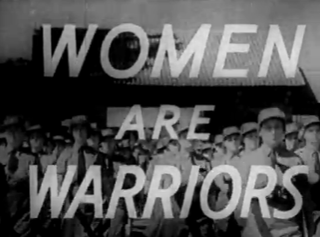
Yorkton Film Festival (YFF) is an annual film festival held in late May in Yorkton, Saskatchewan, Canada.
Flutter is a 2006 Canadian anime-style animated short by Howie Shia, co-produced by PPF House and the National Film Board of Canada.

Blake is a 1969 Canadian short documentary film produced by the National Film Board of Canada (NFB). The film was directed by Bill Mason, and his fellow filmmaker Blake James, who pilots his own aircraft and lives by a unique code. Blake is Mason's cinematic testimonial to his friend and his "hobo of the skies" lifestyle.

Stuart Legg was a pioneering English documentary filmmaker. At the 14th Academy Awards in 1941, Legg's National Film Board of Canada film Churchill's Island became the first-ever documentary to win an Oscar.
Jane Marsh Beveridge was a Canadian director, producer, editor, composer, screenwriter, teacher and sculptor. She was best known as one of the pioneering filmmakers at the National Film Board of Canada (NFB).
Saskatchewan Air Ambulance is the air ambulance service for the province of Saskatchewan and for the Ministry of Health (Saskatchewan).

Wasp Wings is a 42-minute 1945 Canadian documentary film made by the Royal Canadian Air Force (RCAF) Overseas Film Unit and the National Film Board of Canada (NFB). The film takes its name from the colourful markings known as invasion stripes that were painted on Supermarine Spitfire fighter aircraft on D-Day, making them look like "angry wasps".

Bush Pilot: Reflections on a Canadian Myth is a 22-minute Canadian documentary film, made in 1980 by the National Film Board of Canada (NFB) and directed by Norma Bailey and Robert Lower. Shot in northern Manitoba, the film explores the myth of the bush pilot as a heroic and iconic figure in the Canada's north.

Wings on Her Shoulder is a 10-minute 1943 Canadian documentary film, made by the National Film Board of Canada (NFB) as part of the NFB's The World in Action series. The film, directed by Jane Marsh, depicts the role of the Woman's Division in the Royal Canadian Air Force (RCAF) during the Second World War, who freed up men for flying duties.

Evelyn Spice Cherry was a Canadian documentary filmmaker, director, and producer. She is best known for her work as the head of the Agricultural Films Unit at the National Film Board of Canada and as a member of the British Documentary Film Movement.

Wings of a Continent is a 1941 Canadian short documentary film, part of the wartime Canada Carries On series of short films by the National Film Board of Canada, produced for the Office of Public Information. The film was directed by Raymond Spottiswoode—father of filmmaker Roger Spottiswoode—written and produced by Stuart Legg and narrated by Lorne Greene.

Target - Berlin is a 15-minute 1944 Canadian documentary film, made by the National Film Board of Canada (NFB) as part of the wartime Canada Carries On series. The film was produced by Raymond Spottiswoode and directed by Ernest Borneman, from a story by Leslie McFarlane, based on the industrial production of the Avro Lancaster in Canada, from initial production to the first example taking part in a raid on Berlin. The film's French version title was Objectif Berlin.

The Home Front is a 10-minute 1940 Canadian documentary film, made by the National Film Board of Canada (NFB) as part of the wartime Canada Carries On series. The film was produced and directed by Stanley Hawes.

Women Are Warriors is a 14-minute 1942 Canadian documentary film, made by the National Film Board of Canada (NFB) as part of the wartime Canada Carries On series, and dealt with women in war. The film was produced by Raymond Spottiswoode and written and directed by Jane Marsh. The film's French version title is Les Femmes dans la mêlée.

Screaming Jets is an 11-minute 1951 Canadian documentary film, made by the National Film Board of Canada (NFB) as part of the postwar Canada Carries On series. The film, directed by Jack Olsen and produced by Sydney Newman, depicted the contemporary Canadian and international aircraft in production and on the drawing boards. The film's French version title is Avions à réaction.

Proudly She Marches is an 18-minute 1943 Canadian documentary film, made by the National Film Board of Canada (NFB) as part of the wartime Canada Carries On series. The film, directed by Jane Marsh and produced by Raymond Spottiswoode, described the work of Canadian women in uniform during the Second World War. The film's French version is titled Carrières de femmes.

Inside Fighting Canada is an 11-minute 1942 Canadian documentary film, made by the National Film Board of Canada (NFB) as part of the wartime Canada Carries On series. The film, written and directed by Jane Marsh and produced by James Beveridge, was an account of the Canadian military during the Second World War. The film's French version is titled Canada en guerre.

Wounded in Action is a 22-minute Canadian documentary film made in 1944. It was made by the National Film Board of Canada (NFB) as part of the wartime Canada Carries On series. The film documents the work carried out by medical services in saving the lives of those who are wounded in action during the Second World War. The French version title of Wounded in Action is Blessé au combat.

Air Cadets is a 15-minute 1944 Canadian documentary film, made by the National Film Board of Canada (NFB) as part of the wartime Canada Carries On series. The film describes the Air Cadet Movement in 1944 during the Second World War. Air Cadets was directed by Jane Marsh, who was also the writer and editor on the production. The film's French version title is Les Cadets de l'air.
The 3rd Canadian Film Awards were presented on April 22, 1951, to honour achievements in Canadian film. The ceremony was hosted by Mary Pickford.

















